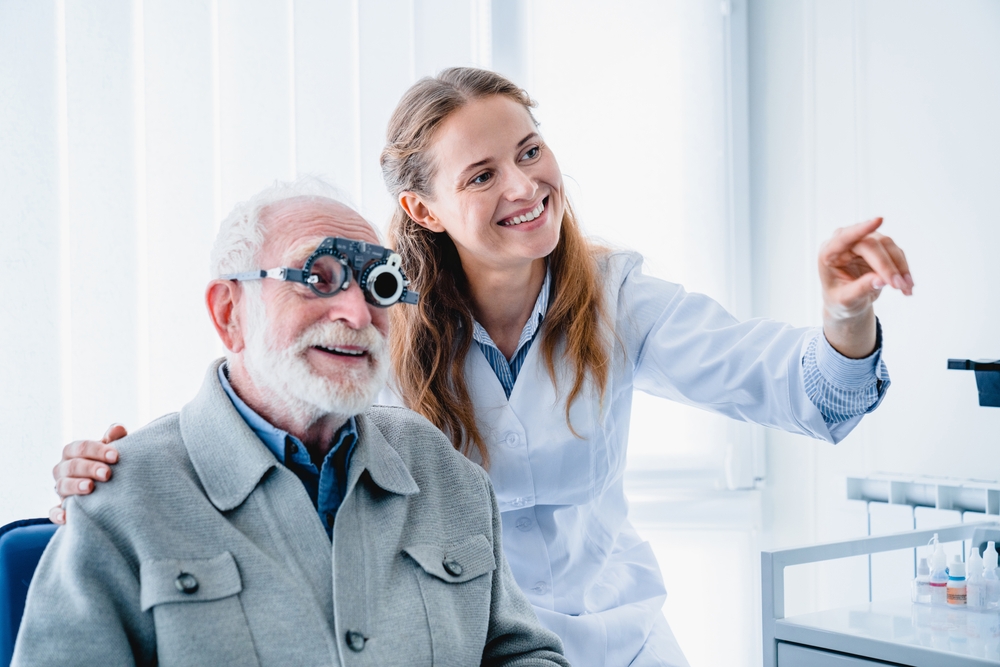We are committed to keeping our patients safe. See how we are increasing our safety measures to help fight COVID-19 here.

As you grow older, it's natural for your eyes to undergo various changes. These changes can affect your vision, making it more challenging to perform everyday tasks. Understanding the aging process of your eyes is crucial to maintaining optimal vision and eye health as you navigate the later stages of life.
Understanding How Your Eyes Change Over Time
As you grow older, your eyes undergo a series of gradual changes that can impact your vision. Here's a breakdown of some of the most common age-related eye changes:
Presbyopia: This condition, which typically begins around the age of 40, causes the lens in your eye to become less flexible, making it harder to focus on close-up objects. As a result, you may find yourself needing reading glasses or bifocals to see clearly.
Dry Eyes: The production of tears can decrease as you age, leading to dry, irritated eyes. This can make it more difficult to perform tasks that require sustained visual focus, such as reading or using a computer.
Cataracts: A cataract is a clouding of the lens in your eye, which can cause blurred or distorted vision. Cataracts are a common age-related condition, and they often develop gradually over time.
Macular Degeneration: This condition affects the macula, the part of the eye responsible for central vision. As you age, the macula can become damaged, leading to a loss of sharp, detailed vision.
Glaucoma: Glaucoma is a group of eye conditions that can damage the optic nerve, often due to increased pressure within the eye. If left untreated, glaucoma can lead to permanent vision loss.
Understanding these changes can help you recognize the signs and symptoms of age-related eye conditions, allowing you to seek timely medical attention and take proactive steps to maintain your vision.
The Importance of Regular Eye Exams for Optimal Vision and Eye Health
Regular eye exams are essential for maintaining optimal vision as you age. These comprehensive examinations not only assess your current vision but also help to detect and monitor any age-related eye conditions.
Many age-related eye conditions, such as cataracts, macular degeneration, and glaucoma, can be detected and treated more effectively if caught early. Regular eye exams allow your optometrist to identify and address these issues before they progress.
As your eyes change over time, your vision prescription may need to be adjusted. Regular eye exams ensure that you have the correct prescription for your glasses or contact lenses, allowing you to see clearly and comfortably.
It's generally recommended that adults over the age of 60 have a comprehensive eye exam at least once a year. However, your optometrist may suggest more frequent exams, depending on your individual needs and any existing eye conditions.
Tips for Maintaining Healthy Vision as You Age
While age-related changes in your eyes are inevitable, there are several steps you can take to help maintain healthy vision and slow the progression of age-related eye conditions. Here are some practical tips:
1. Eat a Healthy Diet: Incorporate foods rich in antioxidants, such as leafy greens, citrus fruits, and fatty fish, which can help support eye health. Maintain a balanced diet that includes a variety of nutrients essential for eye function.
2. Protect Your Eyes from UV Exposure: Wear sunglasses or UV-blocking glasses when outdoors to shield your eyes from harmful ultraviolet rays. Consider wearing a wide-brimmed hat to provide additional protection for your eyes.
3. Stay Active: Regular exercise can help improve blood flow and reduce the risk of certain age-related eye conditions, such as macular degeneration and glaucoma. Incorporate activities that challenge your visual processing, such as reading or playing puzzle games, to keep your eyes active and engaged.
4. Manage Underlying Health Conditions: If you have conditions like diabetes or high blood pressure, work closely with your healthcare providers to manage these effectively, as they can impact eye health. Follow your treatment plan and make lifestyle changes as recommended to support overall health and vision.
5. Quit Smoking: Smoking is a significant risk factor for several age-related eye conditions, including cataracts and macular degeneration. Quitting smoking can help reduce your risk and improve your overall eye health.
6. Stay Hydrated: Drink plenty of water throughout the day to help maintain adequate tear production and reduce the risk of dry eyes. Avoid excessive consumption of caffeine and alcohol, which can contribute to dehydration.
By incorporating these tips into your daily routine, you can take proactive steps to maintain healthy vision and reduce the impact of age-related eye changes.
Taking Care of Your Eyes as You Age
As you navigate the aging process, it's essential to prioritize the health of your eyes. By understanding the common changes that occur and being proactive about your eye care, you can take steps to preserve your vision and maintain a high quality of life.
If you're noticing changes in your vision or would like to schedule a routine eye exam, contact Eyes on Butterfield. Dr. Patel is here to help you maintain healthy vision and enjoy the later stages of life to the fullest. Visit our office in Oakbrook Terrace, Illinois, or call (630) 519-6060 to book an appointment today.








